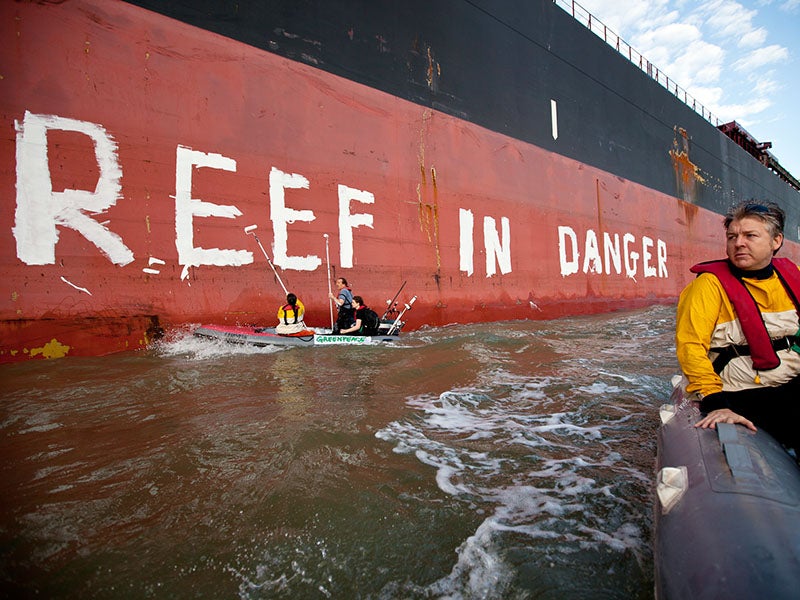Australia’s Climate Inaction is a Human Rights Violation
During the UN periodic review of Australia’s human rights record, a coalition of Australian and international lawyers is asking the United Nations to address Australia’s contributions to human rights violations through its actions that fuel the release of greenhouse gas emissions
Contact
Today, the Environmental Defenders Office (EDO) and Environmental Justice Australia, together with U.S.-based environmental law organization Earthjustice, urged the UN Human Rights Council to recommend that Australia implement measures to reduce its greenhouse gas emissions and take steps to phase out its export of fossil fuels to ensure the full enjoyment of human rights by its people and others around the world.
Approximately every five years, the UN Human Rights Council reviews the human rights record of every UN member state. It is currently accepting submissions in relation to Australia, which it will formally review in early 2021.
“Australia is failing to satisfy its international obligations to prevent immediate and future violations of Australians’ human rights caused by climate change. United Nations human rights experts recognize that, to protect human rights, nations must ambitiously reduce greenhouse gas emissions by phasing out the use of fossil fuels and other activities that emit dangerous greenhouse gases. Instead, Australia’s actions are fueling the release of greenhouse gases which are driving climate change,” said David Morris, CEO of the EDO.
“Climate change is already harming human rights in Australia, including the rights to life, health, food, water, housing, and culture. The massive bushfires in 2019 and 2020 — which were exacerbated by climate change — directly resulted in at least 34 fatalities, killed an estimated 1.5 billion animals and destroyed millions of hectares of landscape as well as over 5,900 homes and public buildings. Smoke pollution contributed to over 400 deaths and over 3,000 hospitalizations for cardiorespiratory problems,” said Ariane Wilkinson, Senior Lawyer at Environmental Justice Australia.
“As temperatures continue to increase, the threat of climate change to our fundamental human rights will intensify. Heatwaves will become longer, more frequent and more intense and hotter temperatures are predicted to increase the risk of mosquito-borne diseases,” said Ms. Wilkinson.
“Indigenous peoples in Australia are especially vulnerable to the impacts of climate change because of their deep connection to the environment. Severe drought hinders water-based cultural practices throughout inland Australia, higher temperatures, and extreme weather events negatively impact biodiversity including culturally significant species, and rising sea levels threaten the communities and culture of the Torres Strait Islands and other coastal Indigenous groups,” said Mr. Morris.
“The United Nations has raised concerns about Australia’s lack of climate action for a number of years now. Despite the devastating and increasing impacts of climate change on human rights, Australia continues to fuel climate change, intensifying the current and future impacts on the human rights to life, health, food, water, housing and culture,” said Noni Austin, Staff Attorney in the International program at Earthjustice.
David Morris said, “Claims by the Australian Government that it will meet and beat its targets under the Paris Agreement do not stand up to scientific scrutiny. The Government’s targets will not help us achieve our key commitment under the Paris Agreement to keep global temperature rise well below 2°C, let alone 1.5°C. What matters in the end is not the accounting, but limiting temperature rise and catastrophic impacts on the environment and human rights.”
“Australia is among the world’s largest exporters of coal and liquefied natural gas and plans to continue expanding these exports. Australia’s fossil fuels will contribute emissions around the world for decades to come, contrary to clear evidence that fossil fuels must now remain unburned to avert the most serious consequences of climate change,” said Ms. Wilkinson.
“Right now, Australia has the perfect opportunity to take strong action to transition to a low emissions economy through economic stimulus investment opportunities to recover from the impacts of COVID-19. Instead we are seeing the interests of fossil fuel projects promoted at a national and subnational level and no mention of the significant potential and urgency to transition to a greener economy,” said Mr. Morris.
“We are asking the UN Human Rights Council to urge Australia to uphold its human rights obligations under international law. All Australians’ human rights should be protected and this requires Australia to take strong climate action now and encourage other countries to do the same,” said Ms. Austin.
Read the Joint Stakeholder Submission to the Universal Periodic Review of Australia.

Additional Resources
About Earthjustice
Earthjustice is the premier nonprofit environmental law organization. We wield the power of law and the strength of partnership to protect people's health, to preserve magnificent places and wildlife, to advance clean energy, and to combat climate change. We are here because the earth needs a good lawyer.